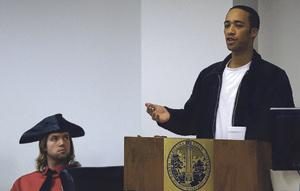
Mark Gusman
The memorandum delivered to the Student Government on March 16 by Vice Chancellor for Student Affairs Tom Stafford has refueled an ongoing struggle between the administration and the Student Senate this term.
This administrative action outraged many of the members of the Student Senate and caused them to question the rights they have, as both students and members of the Student Government.
The two memos, which Stafford personally delivered, suspended the actions of the Student Government in the impeachment of Student Body President Whil Piavis and overruled the Elections Commission’s decision to allow part-time students to vote and participate in the spring student body elections.
Student Body Treasurer Seneca Toms, a senior in horticulture science, said recent events have led him to feelings of disillusionment in regards to his place as a Student Government official.
“It feels as if I’m being played like a puppet,” Toms said. “We are putting out a label saying we have student leadership, but it’s really just a label.”
Sen. Sara Yasin, a sophomore in fashion development and product analysis who was one of two senators recently appointed to the Student Government Operations Committee to ensure fairness in the impeachment hearings, echoed these sentiments. She said the actions of the vice chancellor serve only to further damage the legitimacy of Student Government’s role as a governing body.
“I was anti-impeachment, but I’m against what Dr. Stafford did,” Yasin said. “What’s the point of Student Government if we can’t impeach our own leaders?”
More than 7,000 students would lose their right to vote in student elections and to participate in Student Government if the administration remains firm on its decision to overturn the Constitution Clarification Act, which guarantees these rights to part-time students.
The three candidates for the position of Student Senate president said they are adamantly against the actions of the administration.
Sen. James Hankins, a sophomore in political science, said this is unacceptable and Student Government needs to stand behind all students, whether they are full-time or part-time.
“Sometimes Student Government and Student Senate does stupid things — it happens, we’re human — but to take the power out of any student’s hands to better their university is both belittling and ridiculous,” Hankins said.
Sen. Matt Walton, a sophomore in technology education, also expressed his support for the referendum, explaining that overturning it would send a message to the student body that their vote doesn’t matter.
“Students ultimately need to have their voice heard,” Walton said. “I support this referendum, which clears up any uncertainty in the rights of students.”
Sen. Zach Adams, a junior in industrial engineering, said he was discouraged because Student Government has interpreted that partial students could vote for the past 20 years and in this case, the administration had overstepped its bounds.
“The administration should reserve its power to overturn legislation for a situation where Student Government has committed a serious injustice,” Adams said. “In this case, it was not an extreme enough case.”
Malcontent regarding the administration’s actions concerning this act has prompted several senators to organize a non-Student Government-funded committee called “Yes for 7,000.” The group’s goal is to spread awareness and persuade students to support the referendum.
“I encourage students to vote for this referendum,” said Toms, who sits on the board of directors for the committee. “It’s going to make sure 7,000 students don’t get disenfranchised.”
At their emergency meeting last Thursday, senators expressed passionate views regarding the issue, but Student Senate President Forrest Hinton, a junior in mathematics education and political science, explained there is little the Senate can do to respond to the administration’s actions.
“This is a problem that the election commission has to solve on their own,” Hinton said.